Mass-Scale Emigration From Croatia Has Led To Rise in Corruption - Study Finds
ZAGREB, 15 June, 2021 - The emigration of Croatian citizens, in addition to having incalculable implications for the country's pension, education and health care system, has also lead to a rise in corruption in Croatia, Večernji List newspaper said on Tuesday, citing a study by Tado Jurić, a political scientist and historian from the Croatian Catholic University.
The study showed that corruption and emigration were interrelated.
Jurić compared corruption and migration trends from 2012 to 2020, notably the number of Croatians who emigrated to Germany, the country where most Croatians go to in search of work and a better livelihood, and the ranking of Croatia in the global corruption index, and found that corruption was more pronounced when the number of people who left the country was higher. Croatia ranked 63rd among 180 countries included in the corruption index in 2019 and 2020, and 50th before the emigration wave reached its peak.
"Common sense says that if people who are not involved in corruption networks emigrate and those who stay are involved in such networks, corruption activities will be even easier to carry out and more frequent. If critics leave, all the better and easier for those criticised," Jurić says, adding that corruption is deeply rooted in Croatian society and has become a parallel system that undermines the economy.
"Corruption has done even more damage to the Croatian national identity, the sense of unity and solidarity, and to Croatian culture in general than it has done to the economy, which is unquestionably enormous. The main negative effect of corruption affected the country's human resources and political stability. In Croatian society, corruption has become a privilege of the elites, but so-called major corruption, political corruption and clientelism should not be confused with so-called civil corruption.
"So-called elite corruption has given rise to a special phenomenon in society which could be called 'a revolt of the elites'. It is the elites that use the media for their everyday protests against the media, citizens and institutions, making citizens accustomed to the practice that they should not express their dissatisfaction with politicians, but that politicians should express their dissatisfaction with them," Jurić said.
The study shows that 65.3 percent of 178 small, medium and large companies polled said that corruption has been on the rise in the last five years, while 32.4 percent believe that there has been no significant change.
For more about politics in Croatia, follow TCN's dedicated page.
Ruđer Bošković Institute Chemist Team Makes Progress in Life Formation Research
June 10, 2021 - Do you ever wonder how life was formed? Always dedicated to scientific progress, the Ruđer Bošković Institute chemist team made progress in life formation research supporting the theory that the first molecules needed to develop life were formed on the surfaces of minerals in pre-historic times.
Science explores our present reality, but also the past. With many knowledge or credible theories on evolution, the very basic questions such as „how life came to form“, remain unclear. But why?
„Given that condensation (the process of water vapor turning back into liquid) of free amino acids is thermodynamically unfavoruable process in the water medium, it is a great mystery how it came to the formation of peptides before life on earth“, states the Ruđer Bošković Institute (IRB) press release.
It's worth noting that the thermodynamically unfavourabale process means the process is irreversible, which means it can't be reconstructed, and that's why scientists can see the formation of peptides, chains that connect amino acids that are crucial for life.
So, meet prebiotic chemistry – a study of chemistry dedicated to address and discover how organic compounds formed and self-organized for the origin of life, but so far without consensus.
But, progress is made once again thanks to the always active IRB. IRB's chemist team (José G. Hernández, dr Krunoslav Užarević, and Ph.D. student Tomislav Stolar,), in collaboration with colleagues from the pharmaceutical company Xellia (dr. sc. Ernest Meštrović, mag. chem. Saša Grubešić and dr. Nikolaom Cindro from the chemical department at the Faculty of Science (PMF), University of Zagreb), showed that with mechanochemical activation in a solid-state, the amino acids (organic compounds that combine to form proteins, with both being considered „the building blocks of life“) - such as glycine or alanine form peptides on mineral surfaces.
This supports the theory that life molecules could've been formed on Earth's mineral surfaces. The paper titled „Mechanochemical Prebiotic Peptide Bond Formation“, published in the prestigious Angewandte Chemie scientific journal published on behalf of the German Chemical Society presents these findings in greater detail.
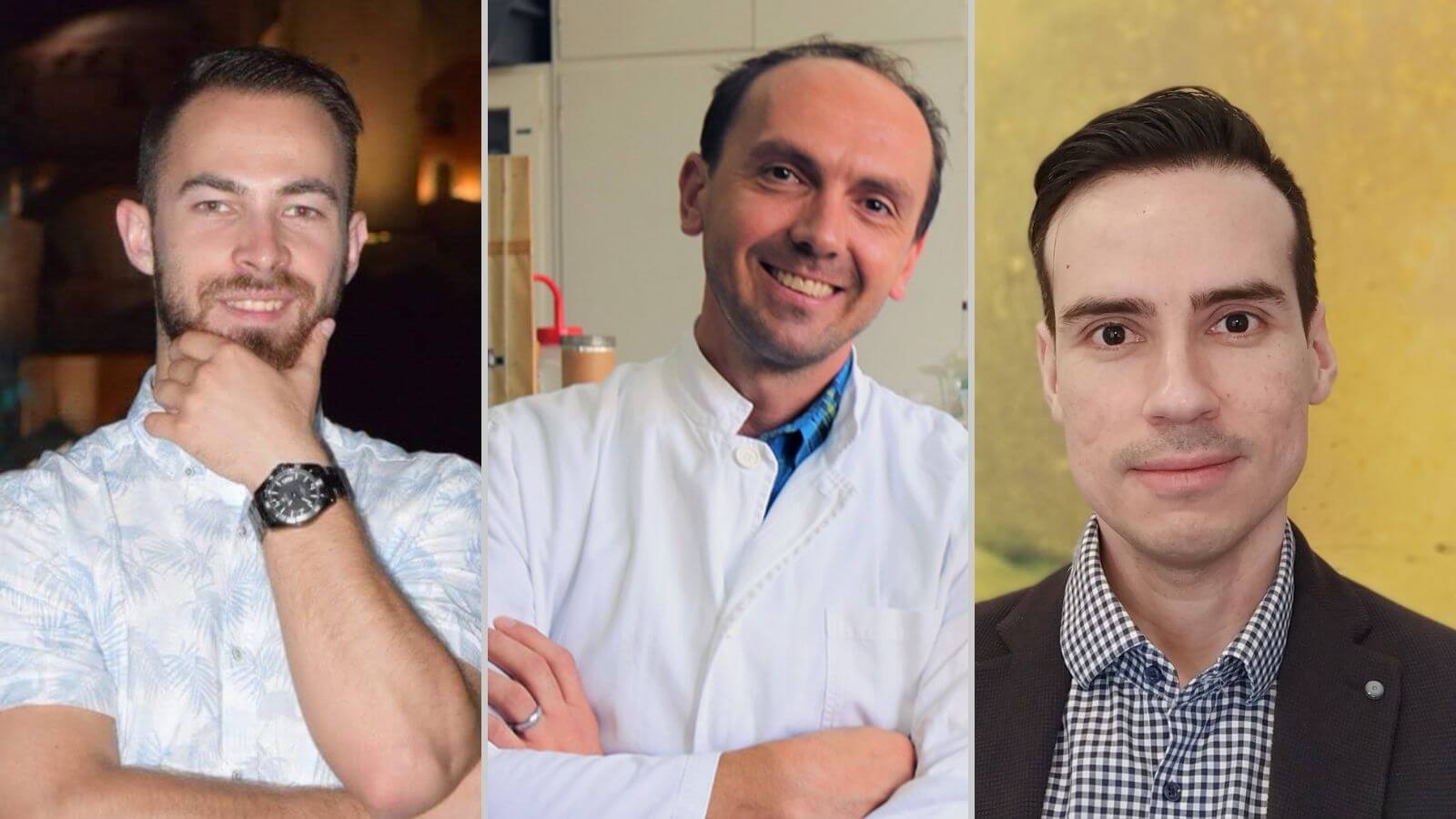
Stolar, Užarević and Hernandez © Ruđer Bošković Institute
„In this research, we showed that mechanochemical activation of free glycin ground with ball mill allows the new oligomers (molecules made of few similar or identical repeating units) by adding minerals that are basic components of earth surface and meteorites. With the identification of organic and inorganic molecules present in the Solar system, it's important in laboratory conditions to develop suitable processes that would explain the presence of these molecules. Such fundamental knowledge can then be applied in modern synthetical chemistry“, said a member of the IRB chemist team Tomislav Stolar. Stolar also participated in developing a new material known as CuZn-MOF-74 on which TCN previously wrote about.
The research was financed by the Croatian Science Foundation (HRZZ), and the next step is to apply this knowledge to synthesize new chemicals, which was one of the purposes of the research described by HRZZ.
IRB adds that the fact that various geological processes change the earth's surface, there is no historic evidence that could definitely answer how life on Earth was formed. It is believed that the first simple molecules triggered complex molecules to form in a process called chemical evolution and from that, life further continued to develop. Liquids, solid surfaces, or the phases between the two could've been potential conditions for these reactions, and mechanical energy sources were most likely found in meteor strikes, erosion, earthquakes, and more while thermal energy was most likely supplied by geothermal sources.
Learn more about Croatian inventions & discoveries: from Tesla to Rimac on our TC page.
For more about science in Croatia, follow TCN's dedicated page.
Cultural Identity of Vukovar: New Book Presented in Vukovar
June 9, 2021 - The fascinating question of the Cultural Identity of Vukovar is researched in a new book edited by Dr. Mateo Žanić and Petar Elez. However, as the editors stressed in the introduction, further research is needed to encompass all social groups in Vukovar and their contribution to the heritage of Vukovar.
After being published back in April this year, the book „Cultural Identity of Vukovar – Contribution to Investigating Heritage and Successors“, was presented this Wednesday in Vukovar. As Ivo Pilar Social Research Institute writes on its website the book was published in cooperation with the Vukovar State Archive, so it was only suitable that the first book presentation was held in Vukovar at the videoconference hall of College Of Applied Sciences „Lavoslav Ružička“ (named after a famous Croatian chemist whose work is awarded a Nobel Prize). In addition, the event marked International Archive Day.
The book was edited by Dr. Mateo Žanić and Petar Elez, and the presentation, alongside editors, saw scientific experts Dr. Dražen Živić, Mirela Hutinec, and Dr. Domagoj Tomas talks about the book.
„Fast events triggered by globalization process and information revolution which paradoxically lead to today's societies being fiercely occupied with the meaning of past, and preserving its valuable traces. In that context, there is a spreading interest for heritage that holds an important component to understand the relationship between the past and present“, says the editorial introduction of the book.
The editors went on to explain how „the city proved to be futile to interpret the meaning of heritage and its contribution to cultural identity,“ and the editors wanted to present various aspects of Vukovar's cultural heritage.
Apart from editors Žanić (who wrote a chapter „Layers of memories and material heritage in modern-day Vukovar) and Elez (author of the chapter „State archive in Vukovar and development of archive service in Vukovar-Srijem County“), the book features eight more authors. Ivan Rogić (Whose Heritage? Who is the successor?), Dražen Živić (on Vukovar's feudalists), Vlasta Novinc („Danube, food, Corso“), Dragana Drašković (on the cultural life of Borovo Selo), and more by Dragan Damjanović, Toni Roca, Ivana Bendra and Ivan Hubalek.
With these broad presentations of culture and heritage in Vukovar, editors hope this book will encourage further research as they are aware this is certainly not the final word on these interesting questions and issues.
„As editors, we are aware that the book does not deal with topics that concern different social groups that left their trace in Vukovar end enrich the history of the city. We hope that future editions that will deal with this topic expand the reach of issues and help us to realize better what do we inherit from the past and why is that important“, concludes the introduction of the book.
So far, the book is available only in Croatian, and research that will, as editors say, deal with other social groups in Vukovar is yet to come. Keeping in mind the terrible aftermaths of the war in Vukovar in the 90s and inter-ethnic tensions, further findings on joint cultural contribution to Vukovar may indeed be the enlightenment needed for peaceful cohabitation and development of Vukovar as a perspective city in Croatia.
Speaking of heritage, learn more about UNESCO recognized heritage in Croatia on our TC page.
For more about science in Croatia, follow TCN's dedicated page.
War Criminal Ratko Mladić Handed Down Final Verdict of Life Imprisonment
ZAGREB, 8 June, 2021 - Wartime Bosnian Serb army commander Ratko Mladić was on Tuesday given a final verdict of life in prison for war crimes committed in Bosnia and Herzegovina.
The information was conveyed to reporters in The Hague by Murat Tahirović, president of the BiH Association of Genocide Victims and Witnesses.
Tahirović was able to follow the announcement of the verdict in real time while reporters and most of the other audience followed it with a delay and without access to the courtroom.
For more about politics in Croatia, follow TCN's dedicated page.
Friends of Croatia: UNICEF - Croatia an Example to the World When it Comes to Breastfeeding
May 27, 2021 - The sixth article in the "Friends of Croatia: UNICEF" series explores the work of the UNICEF Office for Croatia. What is done regarding children's rights in Croatia, positives, and negatives, and how can you help if you want to?
To ensure that our world even stays the same, let alone improves, new generations are essential. But, before they grow old enough to participate in society, society must first take care of the youngest ones to grow and develop. Society must ensure for kids that they grow up in families filled with love, make sure that kids can go to school, that they are healthy, safe from violence, that they are not hungry or thirsty, and give them overall opportunity to make it in the world.
Basically, children have rights, and they are in more detail elaborated in 54 articles. For more details, have a look at the Convention on the Rights of the Child that came to power on September 2, 1990, by the United Nations (UN) General Assembly.
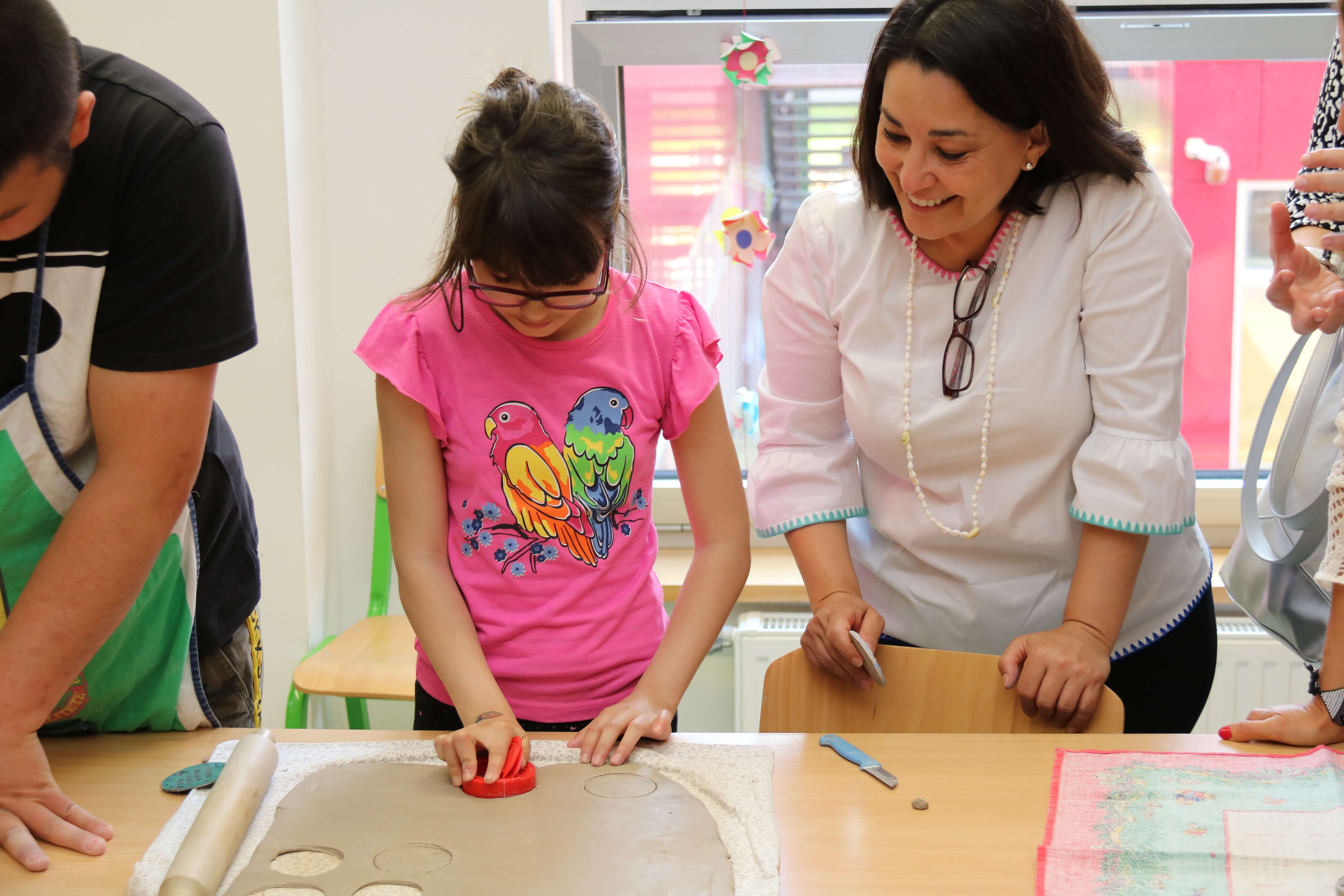
Regina M. Castillo, UNICEF office for Croatia representative with children with disabilities in Centre Tomislav Špoljar in Varaždin © Marin Ilej/UNICEF
The UN is dedicated to seeing this Convention is being respected, and United Nations International Children's Emergency Fund, commonly known as UNICEF, specializes in the issues of children's rights. Established in the aftermath of World War II, UNICEF has been at the frontlines of humanitarian crises, armed conflict, and natural disasters.
„Undeterred by the scale of the crises, we rise to the challenge, reimagine what is possible and respond by helping millions of children survive and thrive. Our on-the-ground expertise has reached more than 191 countries and territories, through committed partnerships and a passion for innovation“, says UNICEF on its official website.
Croatia signed and agreed with the Convention, and UNICEF today has its own office in Zagreb. Furthermore, it's worth noting that UNICEF has existed for 75 years, and despite firstly coming to Croatian territory while the country was part of the former Socialist Federal Republic of Yugoslavia, UNICEF has been with Croatia since the organization was established.
„Many people do not know that UNICEF helped to eradicate malaria in Croatia and that UNICEF played a key role in the development of modern dairy. Dairies were built in Zagreb, Rijeka, and Split, and factories for the production of powder milk in Osijek and Županja. Milk was distributed in schools, and for many children, it was their only meal during the day“, says Regina M. Castillo, UNICEF Office for Croatia representative.

Regina M. Castillo, UNICEF office for Croatia representative © Marin Ilej/UNICEF
The UNICEF representative is elected for a five-year mandate, and Regina M. Castillo came to her function in Croatia in 2019. Her career in the UN started in 2001 and was in charge of economic and social questions in the Executive Office of the UN chief secretary Kofi Annan in New York. This was followed by Castilla moving to work in the mutual program for HIV/AIDS, known as UNAIDS. She was first the director of private sector partnerships in Geneva (2006-2012) and then moved to be the director for Bolivia, Ecuador, and Peru (2012-2015). She majored in International relations and public politics.
Born in Nicaragua, she first started her career in the 1990s as a diplomat, and she was also the headmistress for international trade in the Nicaraguan Trading Ministry.
Helping Croatia before it was cool (or an independent country)
Castillo went on to continue that after World War 2, UNICEF fed six million children every day, which included many children in Croatia.
„One of those children was our dear colleague, prof. Josip Grgurić, who is still working tirelessly for the youngest. He still remembers the yellow cheese that was part of UNICEF's humanitarian package for families, as well as the chocolate that he then tasted for the first time. He later worked at the children's hospital in Klaićeva, which UNICEF helped found, and he still works hard on UNICEF’s Child-Friendly Hospital Initiative“, says Castillo indicating how valuable but also inspiring UNICEF can be to children. Castillo added that in the Homeland War, UNICEF was the first organization on the ground, making sure that children and families received the necessary psychosocial support and humanitarian packages. After the war, they educated children on how to protect themselves from landmines.
Today Croatia developed, joined NATO and EU, and is a modern European country. With such progress, there have been many improvements in respect to children and their rights.
„Croatia has a low mortality rate of children under the age of five, extremely low stunted growth rate due to inadequate nutrition in the first years of life and the enrolment rate of children in primary school is almost 100 per cent“, pointed out Castillo.
„Croatia is an example in the world when it comes to the promotion of breastfeeding. It is rare that all public maternity wards in a country have the status of 'Child-Friendly Hospital'. With the support of UNICEF, partners have organized a network of breastfeeding support groups, and now we have more than 200 support groups in Croatia“, added Castillo on what the world can look up to this small South-Eastern European country.
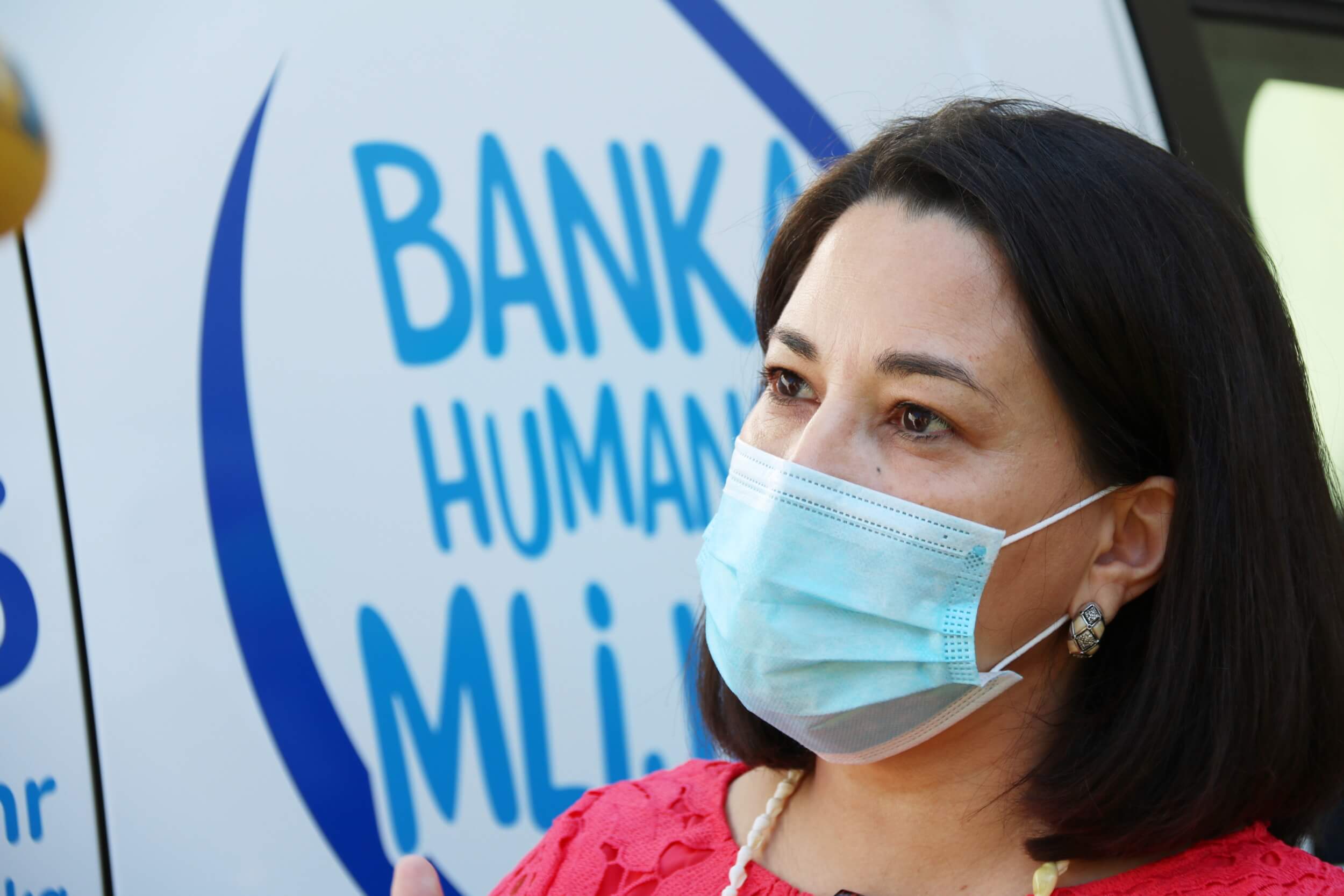
Regina M. Castillo at Human milk bank © Marin Ilej/UNICEF
Still, there are some issues Croatia needs to address and are far from ideal at the moment.
„There are still differences when it comes to access to services for children, depending on where they live and the conditions in which they grow up. Children with disabilities, as well as children from the poorest families, especially in rural areas, often do not have the opportunity to attend kindergarten and do not have the same access to specialized health services and therapies as children in urban areas. The focus of UNICEF in Croatia is on the most marginalized children: children with disabilities or developmental delays, children growing up without adequate parental care, children from minority groups, children at the risk of poverty and exclusion. UNICEF’s programs are focused on the well-being and protection of every child, with a special focus on the most vulnerable children“, pointed out Castillo.
Campaigns and programmes such as “Every child needs a family”, “The first three are the most important”, and “Stop violence among children” are perhaps the most known public action by UNICEF in Croatia, but returning to the good practices of breastfeeding, Castillo emphasizes the establishment of the Human Milk Bank in her current mandate.
„Thanks to the Human Milk Bank, prematurely born and seriously ill newborns (who do not have access to their own mother's milk) can receive milk donated by other mothers. We continually work on reducing the risk of disasters, support the development of quality foster care and provide support to parents in the upbringing and care of children through workshops and we work a lot with young people“, said Castillo.
In general, UNICEF has different types of offices in countries, and regarding the Croatian office, it’s a Country Office. In other words, most of the resources (human and financial) are invested in programs in Croatia. Castillo says that the five-year mandates have priorities that are determined in cooperation with partners. And while 80 percent of the funds raised are invested in programs for girls and boys in Croatia, there are funds and support programs for children outside of the country.
“For example, in 2018, UNICEF supported child health care in parts of Ukraine affected by the conflict and helped the building of five inclusive children's playgrounds in two refugee camps in Jordan in cooperation with the Ministry of Foreign and European Affairs in 2019. Through the ‘Schools for Africa’ program , which includes many kindergartens and schools throughout Croatia, UNICEF supports the education of girls and boys in Madagascar", Castillo listed several examples.

Regina M. Castillo, UNICEF office for Croatia representative with children on Media Literacy days press conference with Radovan Fuchs Minister of Science and Education, Krešimir Partl, State Secretary at Ministry of culture and media and Robert Tomljenović, Deputy Director of the Council for Electronic Media © Marin Ilej/UNICEF
Overall, the UNICEF Office for Croatia works closely with the Croatian Government, and most notably, with the Ministries of Social Welfare, Education, Health, and the Ministry of Foreign and European Affairs. Other partners also include experts (Croatian experts, but also building on expertise and good practice from all over the world), professional associations, academia, services providers, and NGOs.
“UNICEF’s goal is to connect all stakeholders and to advocate and support systemic change for the well-being of all children. System change is a gradual process, and it can be challenging, but when it comes to children’s rights, every step forward is well worth the effort”, explained Castillo.
Croatian citizens showing support for UNICEF
On one hand, Croatia is a good country with low mortality rates of kids and a role model for breastfeeding promotions. On the other hand, however, peer to peer violence (on whose suppression the aforementioned “Stop violence among children“ campaign works heavily on), and unequal approach to education between rural and urban areas show Croatia has both its ups and downs. Unfortunately. The downside sometimes overshadows all the positive things.
One such instance was the tragic death of a two-year-old girl from Nova Gradiška on Easter Sunday. The death of a severely injured girl, who was brought to Zagreb's children's hospital after suffering abuse and heavy beating from her biological parents (and from whom the girl was taken and given to a foster family but was then returned back to biological parents), sparked controversy and citizens outrage, culminating in changes in social welfare law, as well as sacks and investigations in the welfare center in Nova Gradiška.
„We are deeply saddened by the tragic death of two-and-a-half-year-old Nikoll on Easter Sunday. There are no words to express the pain of such a terrible event. Unfortunately, there are no simple and quick solutions to prevent violence against children. For years, UNICEF in Croatia has been continuously and persistently working in the field of child protection, educating experts from the social welfare system, but also other experts who work with children and families, such as experts from the health care, education, and justice systems. UNICEF implements various support programs for parents, and it is fully committed to the development of foster care and the improvement of the legislative framework. However, UNICEF is also aware that society as a whole, has a long way to go to achieve the goal that every girl and every boy is guaranteed the best possible care and protection. UNICEF will continue to work actively, persistently, and dedicatedly with all partners to achieve it”, commented Castillo.
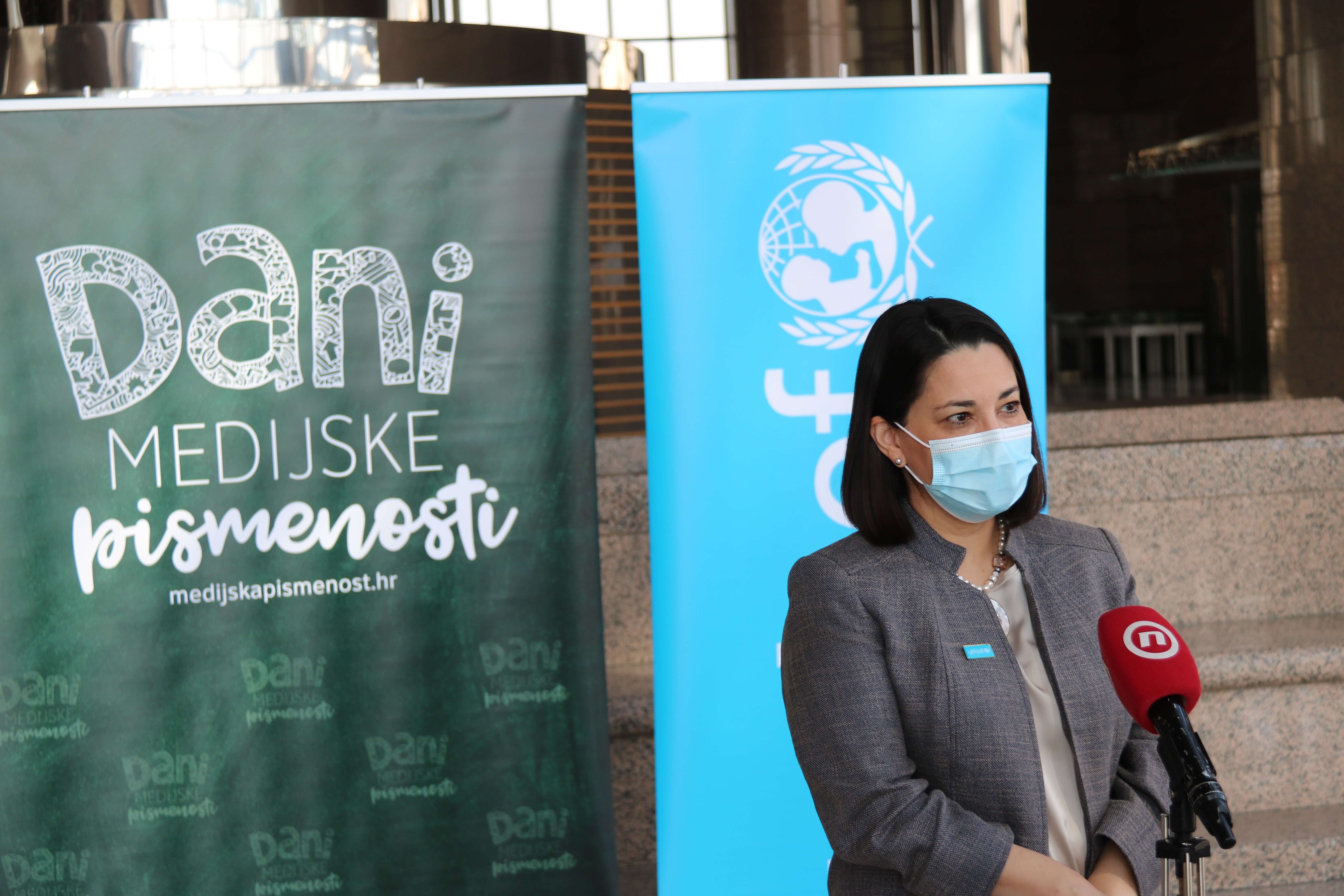
Regina M. Castillo talking on Media Literacy days press conference © Marin Ilej/UNICEF
However, Croatians recognize the importance of the UNICEF mission. Before Covid, UNICEF annually collaborated with the Museum of Illusions on the Museum of Reality exhibition which displayed the problems children faced worldwide, but which also showed what changes and solutions UNICEF brought to those areas.
“Experience tells us that citizens are ready to support the youngest, in Croatia and beyond. Implementation of our programs would not be possible without the support from citizens and companies that placed the focus of their CSR activities precisely on children. We especially value the support from our Childhood Guardians, donors who support our work with regular monthly donations and allow us to regularly conduct our programs for boys and girls, as well as react quickly with much-needed assistance in crisis situations like the earthquakes in Croatia and the COVID-19 pandemic that affected all families. UNICEF is always in the field with the most vulnerable children and their families”, notes Castillo.
In the end is important to note, that while children are recognised as a particularly vulnerable group, all human rights apply equally to children.
“All the rights enshrined in the Convention apply to every child, regardless of a child’s country of origin, gender, religion, and nationality. Every child, by birth, has all his/her rights, the right to grow up in a safe environment, to have a family, to have access to health care and education, to be able to play and develop his/her interests and reach his/her full potential”, concludes Castillo.
The five-year mandate is an agreement that sets priorities in advance, so Castillo warned that there is no opportunity for making donations outside of that framework. UNICEF office occasionally does get messages from citizens who need advice or help on issues outside of that frame, but nevertheless, UNICEF can offer them help by referring them to institutions and addresses that can offer citizens the necessary support, financial support, or information.
With expertise mentioned several times throughout this story as the insurance of delivering the best solutions to issues children face, UNICEF is always on the lookout for new people. If you want to make a change in the world while earning a fair wage yourself, check out what expertise UNICEF is looking for right now.
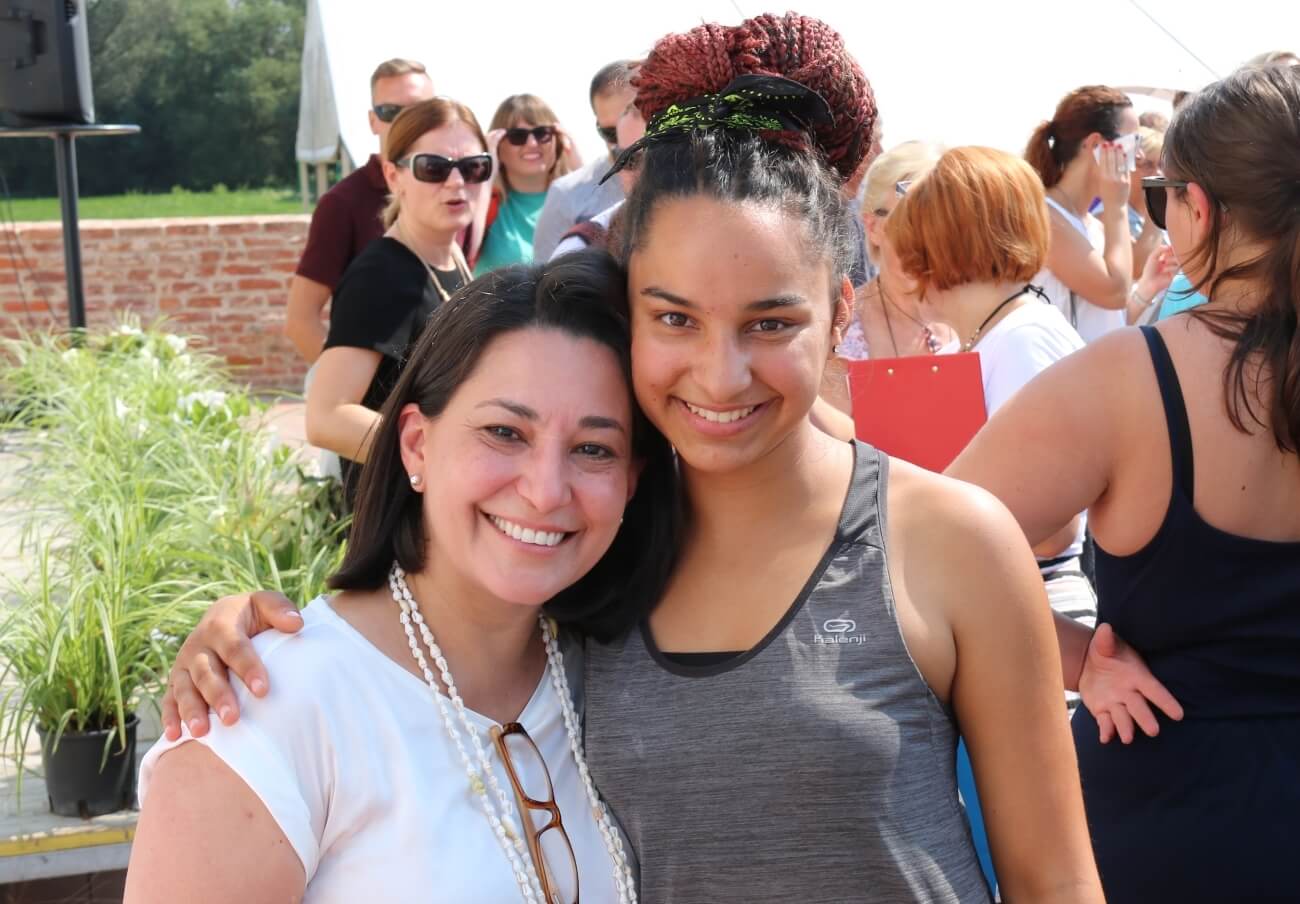
Regina M. Castillo on a foster family gathering © Marin Ilej/UNICEF
UNICEF Croatian Office is situated on Radnička cesta 41/7. To inform the public of their work, they built a considerable presence on Facebook, Twitter, Instagram, Youtube, and Linkedin. You can also find all UNICEF-related info for Croatia on their official website, and contact them via mail: This email address is being protected from spambots. You need JavaScript enabled to view it. or on phone numbers: +385 1 2442 660 and +385 1 2442 661. You can use the website to donate to a cause in Croatia too. Additionally, there are numbers: +385 1 4095 855, +385 99 2692 196, and +385 91 621 1039 for more details on donating to Croatia as well as e-mail address This email address is being protected from spambots. You need JavaScript enabled to view it.. You can also leave a donation to UNICEF in your will, and a phone number +385 1 3031 640 specializes for the issue in Croatia. If you find yourself in Croatia and you want to volunteer for UNICEF, more info can be found by sending a mail to This email address is being protected from spambots. You need JavaScript enabled to view it. and on phone number +385 1 3031 646.
And of course, you can donate for a good cause to UNICEF for any action the fund is internationally involved in.
To read more from the series "Friends of Croatia", follow TCN's dedicated page.
For more about UNICEF in Croatia, follow TCN's dedicated page.
Ruđer Bošković Institute (IRB) Open Doors in 2021: Virtual Event To Present Science to Public in May
May 15, 2021 -The Ruđer Bošković Institute of Science (IRB), the top science facility in Croatia, is hosting a public event. Despite the event being online, the educational and entertaining side of the 17-year-old manifestation won't go amiss.
With the pandemic still causing havoc, events happen either with a limited number of visitors or in the virtual world. And with Ruđer Bošković Science Institute (IRB) being both socially responsible and brilliant in using modern technologies in the best possible matter - chose the latter. The doors of the Ruđer Bošković Science Insitute, from May 18th until May 22nd, unlike previous years, will not be as open as they were before for the public, but the scientific platforms which will be launched on the ODI2021 website aim to ensure an educational and fun experience.
The doors will be open to ''children of all ages, their parents, teachers, students, professors and everyone with a curious and open mind and an adventurous spirit“, IRB stated, welcoming people to join the platform in the description of their Facebook event announcement.
All the content will be available on social media under the following hashtags: #odi2021hibrid, #odi2021, and #istraziplatforme.
Additionally, you can follow the event on Youtube, Instagram, and Twitter.

Ruđer Bošković, painted by R. Edge Pine in London, 1760 © public domain
The Ruđer Bošković Institute is named after Ruđer Bošković, a famous Croatian scientist and philosopher (May 18, 1711, in Dubrovnik - February 13, 1787, in Milan).
The online edition of the Croatian Encyclopedia describes Ruđer Bošković as a universal mind that enrolled in various branches of science, was an excellent mathematician, and even a writer, and a poet who also dealt with practical problems such as swamp drainages and more.
''Bošković was the first person in the history of science to introduce the method of the equation of measurement by setting up two conditions that P.S Laplace later explained in a mathematical form, which is why it's called Laplace's method (in recent times it has been referred to as the Bošković.Laplace method)“, according to the Croatian Encyclopedia.
As Biografija.hr states, the IRB Institute was established back in 1950 and was originally focused on atomic physics. Today, however, IRB is the largest scientific research institution in all of Croatia.
''With its size, scientific productivity, international recognition in research, and the quality of scientific personnel and research equipment, it's the leading scientific institution for nature and biomedical sciences, as well as in the research of the sea and the environment“, says the IRB website.
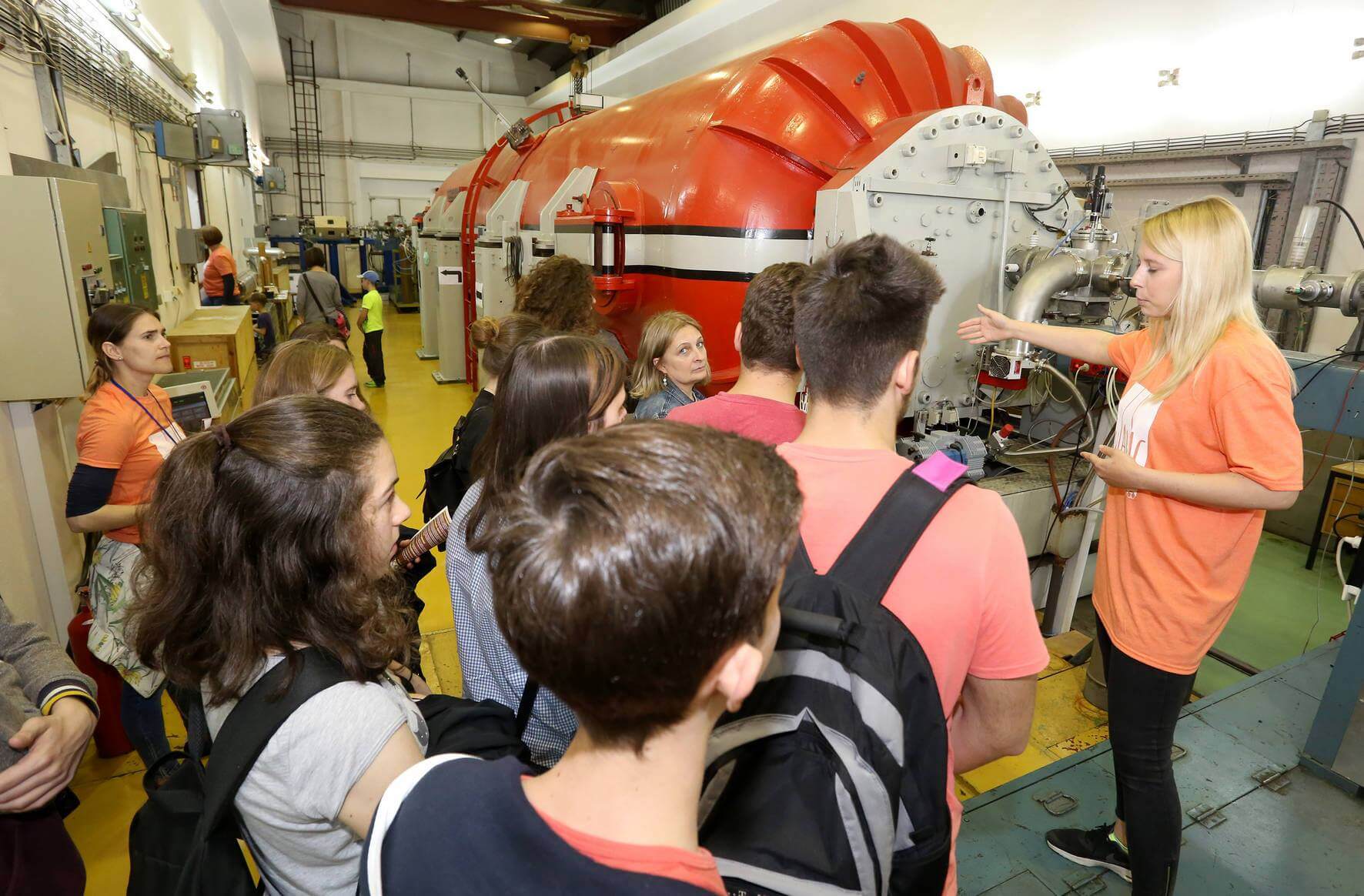
© Ratko Mavar / Institut Ruđer Bošković
The aforementioned success and recognition saw the Ruđer Bošković Institute's open door day, which has been being held since back in 2004, and attracts huge public attention. Three thousand people attended the event back in 2019, making it an excellent opportunity to popularise and introduce science to people of all ages, in the hope society will appreciate scientists' hard work more on the one hand, and attract new generations to pursue scientific or research careers on the other.
Learn more about Croatian inventions & discoveries: from Tesla to Rimac on our TC page.
For more about science in Croatia, follow TCN's dedicated page.
Croatian Immortal: Meet Joža Manolić, Beating COVID-19 at 101!
May 12, 2021 - The way things are going, eternal life might be a reality for this Croatian immortal: meet Joža Manolić, second Croatian Prime Minister and the Yugoslavian secret agent that defeated COVID-19 in his 102nd year of life.
With corona spreading through the world like butter on bread, everyone needs to be careful, but especially people who are old and/or have chronic diseases.
So when someone close to 100 survives the infection, it's a news story worthy of international attention.
And, a similar case most recently happened in Croatia. As Index.hr reports, one man, who turned 101 two months ago was fighting with the virus for three weeks. He was never hospitalized but was under the doctor's close surveillance in his home until he finally recovered. And the story spread throughout Croatia as an amazing fight, but realistically, among Croatians, the winner of this epic battle of man vs. virus was known all along. Even when it seems the virus was taking the lead at one point, there was nothing to do but watch with a smug look and think, „He'll bounce back, that virus walked into Pfizer/AstraZeneca/Johnson&Johnson/Moderna cocktail embodied naturally". Despite being the priority for vaccination by all health standards, this corona patient didn't even took the vaccine because, as he said to the press „nobody invited him, and he was waiting for his turn“.
The victorious patient's name is Joža Manolić, and he is in Croatia what Rip Thorn is in the US (only Manolić is much cooler, sorry Rip).
If you are a paranoid doomsday awaiter, watching the Doomsday clock in panic, which, at the time of writing this article, showed 100 seconds until midnight, Croatians would say you are crazy. As long as Joža Manolić is alive, the world will keep spinning. The ultimate proof corona is bad, but not the end of us.
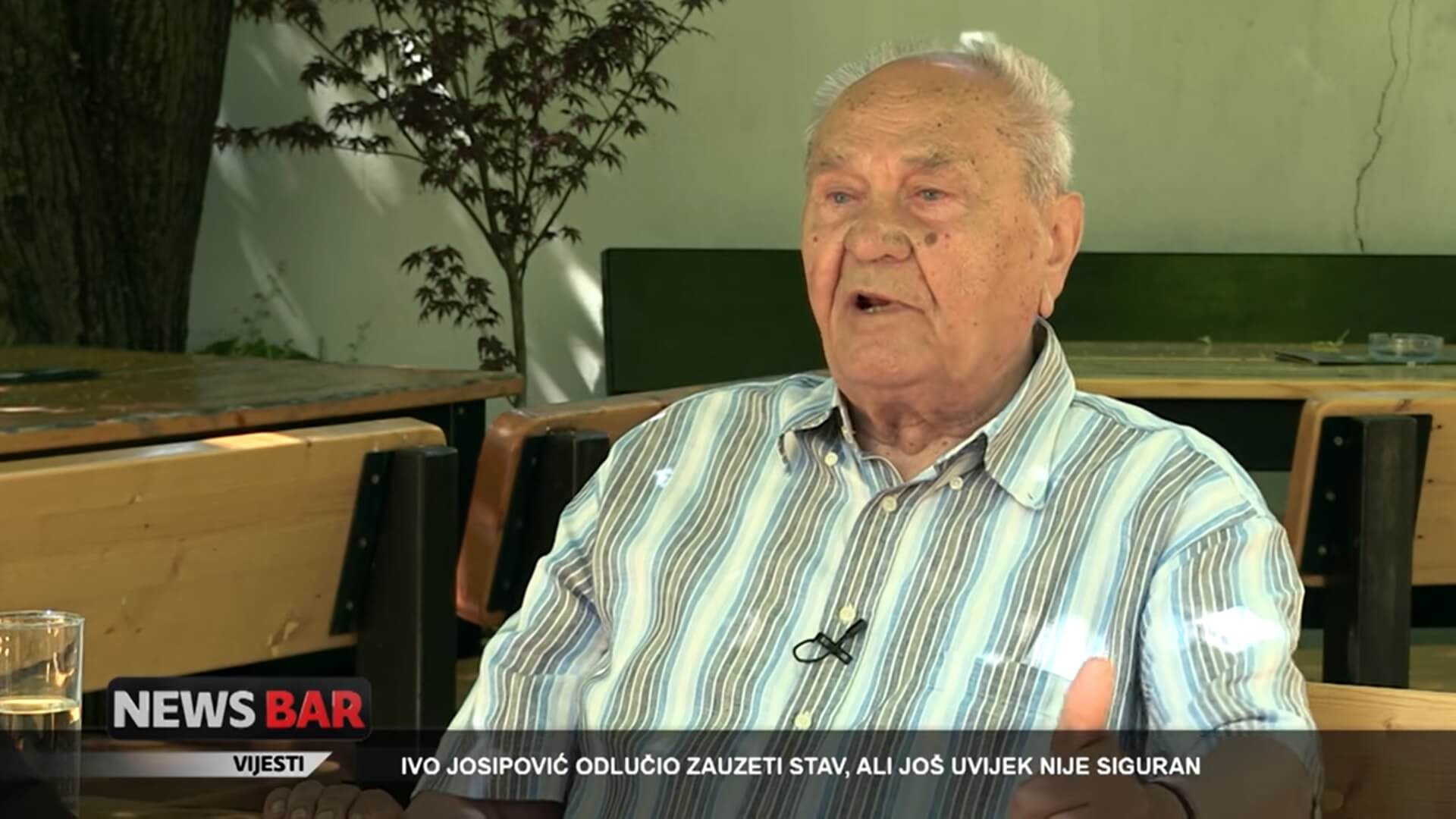
screenshot / NewsBar
Croatian James Bond but without replacement actors every few movies
Born on March 22, 1920, Joža Manolić isn't only the person that has seen it all; he has done it all!
He served as the second Croatian Prime Minister from August 24, 1990, to July 17, 1991, and is one of the founders of the Croatian Democratic Union (HDZ), but before that, he had an impressive carrier in the former Socialist Republic of Yugoslavia.
When he turned 18, he joined the League of Communist Youth of Yugoslavia (SKOJ) and was accepted into the Croatian Communist Party when he was 19. From then, among other things, he was appointed Secretary of the Municipal Committee of SKOJ for Nova Gradiška and was named a member of the Regional Committee of the Communist Party in 1940. When WW2 broke out, he was arrested by Ustasha authorities (of the Independent State of Croatia, an ally of Hitler and Mussolini) for spreading communist propaganda in Nova Gradiška. When released from captivity, he moved to Zagreb, where he started cooperating with Yugoslav Partisans and later moved to the partisan-controlled territory. Moving up in the ranks of communist circles, Manolić broke through the very top of the Yugoslav intelligence service. Firstly in OZNA, notorious for eliminating political opponents, and later to UDBA, which was less drastic but still pretty nasty secret service you didn't want to mess with.
The go-to guy to make history, the Croatian James Bond portrayed by only one man, bright and cool.
There is an expression for the fans of Hajduk Footbal Club that „Hajduk lives forever“ (Hajduk živi vječno). This may be true, but as their game performance shows, it's hard to be as successful in 110 years as Joža Manolić is in 101 years.
What is even more interesting, Joža Manolić was born in 1920, three months before the conclusion of the Spanish Flu pandemic, and his 100th birthday he celebrated in Zagreb, believe it or not, happened the same day, Zagreb was hit with a powerful 5.5 Richter scale earthquake. With two wars, eight epidemics, and several financial crises survived, Manolić is really the guy you want to be next to regardless of what horrible, death-guaranteed menace is heading your way.
Immortality recipe: healthy diet and… being a secret agent?
When famous Croatian satirist and editor of the hilarious Newsbar site, Borna Sor (who is not a stranger to TCN) interviewed Manolić in 2016, he asked „the then young 96-year-old Manolić“ how is it possible that he is still alive?
„Every secret agent either lives a long life or is killed ahead of schedule“, said Manolić in good humor.
As Jutarnji list reported, Manolić's DNA was even sequenced to scientifically research the secret of his long life in 2018. The Korean Biotechnology company doesn't really have a precise explanation of his long life, but Manolić has his entire genome on a memory stick, joining other famous people with such an honor, including Nobel prize winner James Watson, actress Glenn Close, TV host Larry King, rock star Ozzy Osbourn and several more. He is the oldest living owner of a driver's license (although he didn't extend it when he turned 100), an active driver, whose clean traffic record can put to shame much younger people causing havoc on the road, including controversial Croatian entrepreneur Tomo Horvatinčić. He was married twice, last time when he was 97 to a then-60year-old woman with whom he was a decade in a relationship. Today he is sadly a widow, outliving both of his wives.
Whether it's any famous Croatian personality or internationally recognized as Eddie Van Halen, Hugh Heffner, or Prince Phillip, there isn't a celebrity death in the country that isn't acknowledged with „Joža Manolić outlived him/her“. As you can imagine, there is an entire group on Facebook dedicated to jokes such as „We need to care for the environment to leave a nicer world to Joža Manolić“, or „Joža Manolić being in Eden before God“.
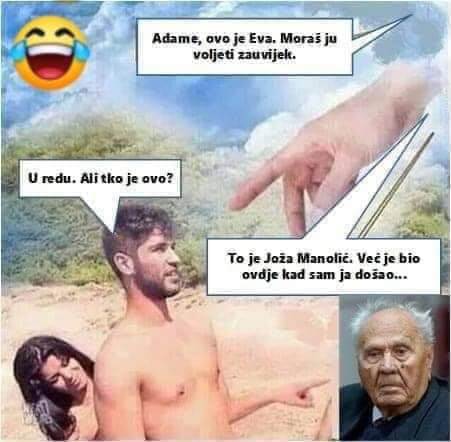
God explaining to Adam and Eve that he found Joža Manolić when he arrived © Joža Manolić je nadživio
Fascinating and publicly active, the author of this text really wanted to use the news of Manolić defeating corona to do an interview with him for TCN.
„Don't contact him for the love of god! He is over a hundred years old and just got over corona“, said my editor Iva Tatić pleading that I continue to bother diplomats and other people instead of one of the biggest living legends Croatia has ever known.
Well, maybe after he gets some rest from corona, there will be a chance for an interview.
Frankly, I don't worry Joža Manolić is going anywhere, but the question is will I live long enough to do the interview with this pristine gentleman that, while Zagreb has tons of fountains, kept the fountain of youth in his backyard.
Learn more about history and politics in Croatia on our TC page.
For more about legends of Croatia, follow TCN's dedicated page.
Friends of Croatia: Ministry of Foreign and European Affairs - The Croatian Side of Diplomatic Relations
May 13, 2021 - The fourth article in the series "Friends of Croatia: Ministry of Foreign and European Affairs" takes a look at the Croatian diplomatic relations from the perspective of the appointed ministry for diplomatic questions and foreign relations.
It takes two to build a friendship. While this series focuses on conversations with ambassadors, diplomats, and representatives of international organizations in Croatia, what is the official take on diplomatic relations and diplomacy from the Croatian side?
The Ministry of Foreign and European affairs (currently run by minister Gordan Grlić Radman) is the branch of the Croatian government that is the first and foremost point of contact and communication with the international community. If you are a country that wants to have diplomatic relations with Croatia, this is the ministry to reach.
„If diplomatic relations have been established between two countries, the sending country expresses the intention of opening a diplomatic mission (Embassy) to the receiving country, in this case, the Republic of Croatia, with a verbal note and seeks the consent of the competent institutions of the Republic of Croatia“, explained the Ministry the process of establishing Embassies.
„The competent authorities of the Republic of Croatia carry out the procedure of issuing the consent for the opening of a diplomatic mission and, upon its completion, inform the sending country about the outcome by verbal note. If the decision on giving consent for the opening of the Embassy in the Republic of Croatia has been granted, the sending country can start searching for a location to accommodate the Embassy and start the procedure of appointing an Ambassador," the Ministry added.
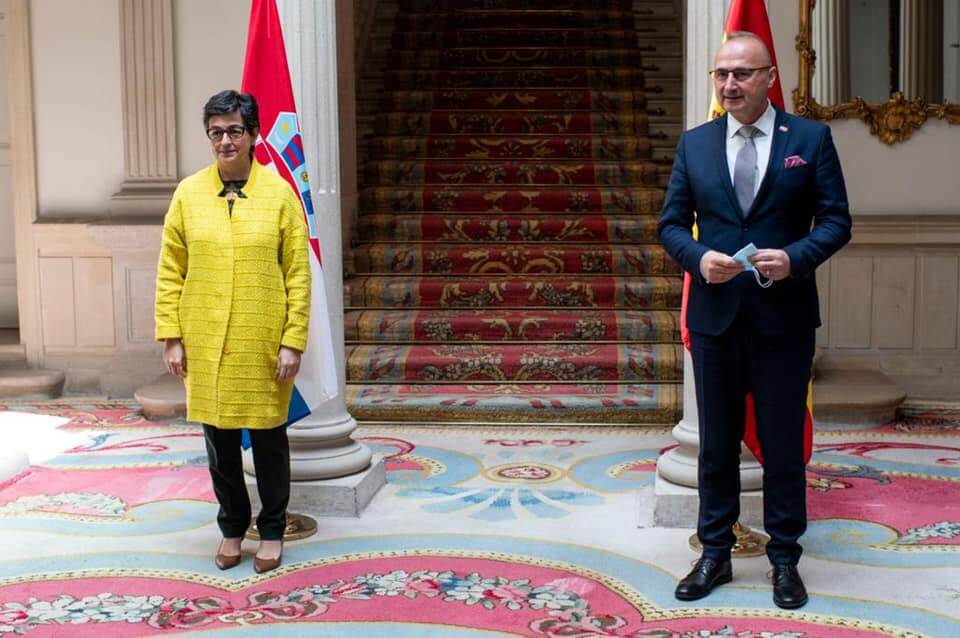 Foreign Minister Gordan Grlić Visiting Spain © Ministarstvo vanjskih i europskih poslova
Foreign Minister Gordan Grlić Visiting Spain © Ministarstvo vanjskih i europskih poslova
With this procedure in place, concluding with 2021, Croatia has 56 resident Embassies, 67 non-resident Embassies, 4 Consulates General, 3 Representative Offices of the bodies of the European Union, 8 Representative Offices of international organizations, and 103 Consulates General/Consulates/Vice-consulates (which what is interesting, as the Ministry pointed out, are handled by honorary consuls who are mostly Croatian citizens).
„Resident Embassies can be based only in the capital city, and they are headed by an ambassador. Non-resident Embassies are located outside the state, with a seat in some other country, usually, an EU member state, while Consulates Generals can be located in other larger cities besides the capital and are headed by general consuls and responsible for their work to the Embassy of the said country“, explained the Ministry.
Croatia may be a young county with 30 years of sovereignty, but the tradition of its diplomacy is traced deep in history. Most notably, in the Dubrovnik Republic, a role model to Croatian diplomats even today.
„Croatian diplomats take pride and inspiration in the tradition of diplomacy of the Dubrovnik Republic. As a small country, surrounded by powerful empires and influential Mediterranean city-states, with no military force, the Dubrovnik Republic was able to preserve its foreign policy sovereignty mainly thanks to the diplomatic skills and the awareness of its geopolitical position. These very qualities are constantly a source of inspiration for those who defend the interests of the Republic of Croatia on the modern world's stage“, explained the Ministry.
As is evident by following the work of the Ministry of European and Foreign Affairs, Croatia takes its diplomacy very seriously, and of course, with some countries, this is more evident than in others. One of the most recent examples was with Egypt. At the end of March, as TCN reported, Croatia showed solidarity with Egypt donating 100 books, and additionally, Croatian companies expressed interest in doing business on the Egyptian market.
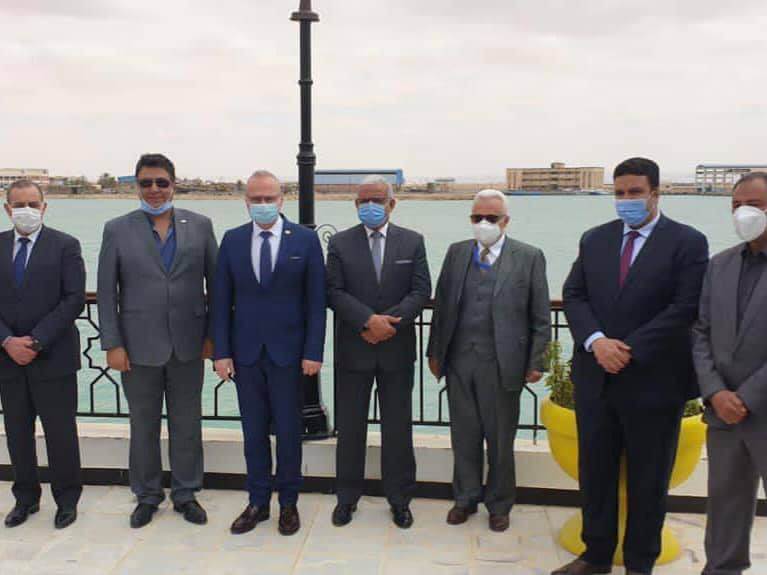
Foreign Minister Gordan Grlić in Egypt © Ministarstvo vanjskih i europskih poslova
„Minister Grlić Radman’s visit to Egypt was very successful, with his Egyptian counterpart Minister Shoukry opening a business forum which was attended by more than 120 Egyptian and Croatian business people“, said the Ministry, adding that representing the interests of Croatian companies and Croatian economy, in general, is an important task for Croatian diplomacy“.
Companies can ask for help by contacting the Ministry, specifically the Directorate General for Economic Affairs and Development Cooperation, or the Croatian embassy in the country of interest directly. No matter which way the request is made (regardless of whether the company has contacted the Ministry or the Croatian embassy in the country of interest directly) the company is kindly asked to fill out a request for support to the exporter, available on the economic diplomacy webpage. Within a couple of days, the company will receive a proposal for the realization of its request or an invitation to a meeting to discuss it jointly in more detail. All requests of exporters are recorded in a database that can be accessed by all employees of the Ministry in Zagreb and abroad in charge of economic affairs and through which the status of the case can be monitored“, explained the ministry the process of stepping on the market in more details.
Embassies in Croatia that are in frequent contact with the Ministry are there for their citizens when visiting the country, but also, the Ministry welcomes Croatians to contact the Embassies for questions regarding traveling to other countries.
„Croatian nationals can obtain more information on entry requirements, COVID-19 restrictions, possibilities of obtaining residence permits or visas, and other types of information about a specific country. Also, Croatian students who are interested in studying or continuing their education abroad can get more information about the educational system and ways of applying for scholarships through foreign Embassies“, said the Ministry.
While the Ministry has no intention of stealing the jobs of the Embassies (such as providing consular assistance), they are at service if needed.
„Croatia is a popular tourist destination, so the Ministry of Foreign and European Affairs recognizes the importance of communication with all foreign nationals who are interested to come and visit us. The Ministry provides information related to e.g. entry requirements, COVID-19 restrictions, the possibility of issuing the residence permits or visas, as well as all other types of information for foreigners who want to visit us as tourists or become residents“, concluded the Ministry.
The Ministry of Foreign and European Affairs is located in Zagreb, at Zrinjevac 7-8.
You can learn more about their work and all things travel-related at their official website and you can also follow them on Facebook, Twitter, Youtube, and Flickr. The phone numbers of various branches within the ministry can be found here.
To read more from the series "Friends of Croatia", follow TCN's dedicated page.
For more about diplomacy in Croatia, follow TCN's dedicated page.
Identity of Boka Kotorska Croatians - Scientific Conference by Ivo Pilar Social Research Institute
May 12, 2021 - Earlier in May, Boka Kotorska, in the town of Tivat in Montenegro, was the host of the scientific conference "Identity of Boka Kotorska Croatians" which will introduce changes in Croatian education.
Croatia has a big diaspora, no secrets there, but its worldwide spread makes you miss the region.
In Boka Kotorska, in Montenegro, Croatia's first neighbor on the southern border after Dubrovnik, not only is there a huge population of Croatians, but they also have a significant cultural impact on the area. So significant it even calls for social science to step in.
As Ivo Pilar Social Research Institute reported on its website, May 6 to 9 saw the conference “Identity of Boka Kotorska Croatians“. The three-day conference gathered crucial scientific institutes in Croatia to the town of Tivat in the Bay of Croatian Saints. Headed with Ivo Pilar Social Research Institute, Croatian Catholic University, Croatian Studies Faculty, Institute of Croatian Language and Linguistics as well as Institute for Historical Sciences in Zadar attended the conference while Croatian ministries of European, and Foreign Affairs, Science and Education, Culture, and Media, as well as Croatian Central State Office for Croatians Outside of the Republic of Croatia, founded the event.
„The scientific conference went well as well as signing conclusions with recommendations that that knowledge on Bokelj Croatians we learned on this conference enter the Croatian national curriculum in important subjects. These conclusions are the crown of our efforts to launch this conference in public, not just in an academical way, but to massively popularize to ensure long-term benefits for Bokelj Croatians as for every educated citizen of Croatia and Montenegro“, said Dr. Željko Holjevac, head of the Ivo Pilar Social Research Institute.
Conference conclusions suggest additions to the curriculum documents on key definitions of Croatian National Identity to make space for Croatians outside Croatia, including Boka Kotorska Croatians. Identity features and creativity of Bokelj Croatians in Croatian education, and the book „Boka Kotorska - the Bay of the Saints and Croatian Culture“, by Vanda Babić to be the mandatory literature for tourist guides in Montenegro.
Final meetings at the conference, as well as sailing with a „Katica“ ship through Boka Kotorska Bay, Saw the participation of Boris Bastijančić, the advisor and representative of the Montenegro president and representer of Croatian parliament and MP, Zdravka Bušić, and others.
„I'm glad to be at this scientific conference, and I want to thank everyone's effort for something like this to happen in Boka Kotorska. I would especially like to thank students that took part in this and gave their part as young people who love the truth of Boka, the place of saints. This is a message that we too need to do something to mark this time with love, hope, and faith“, said the Kotorska bishop, mons. Ivan Štironja.
Some Croatians live outside of Croatia, but maybe you would want to live in Croatia. Learn more about living in Croatia on our TC page.
For more about the Croatian Diaspora, follow TCN's dedicated page.
Croatian President Zoran Milanović: "Serbia's Attempt to Equate Draža Mihailović With Tito Pathetic"
ZAGREB, 12 May, 2021 - Croatian President Zoran Milanović said on Tuesday that attempts to equate Serbian Chetnik leader Draža Mihailović with the anti-Fascist leader Josip Broz Tito were pathetic.
During World War II Draza Mihailovic led the Chetnik movement whose members were Nazi collaborators and were held responsible for mass-scale war atrocities against non-Serbs in Serbia, Bosnia and Herzegovina, Croatia, Montenegro and some other parts of the then Yugoslavia.
On Victory Day observed on 9 May, during a ceremony held in the National Theatre in Belgrade, two big pictures of Mihailović and Tito were displayed one by another on a video-wall, according to local media outlets. In attendance at that ceremony were Serbia's top officials including President Aleksandar Vučić.
This prompted the Croatian president to say today that Mihailović and Josip Broz Tito, who led the Partisan forces in that war, could not be equated.
"Mihailović was a mere fool. He was not the same as Ante Pavelić (the Fascist leader in Croatia during the Second World War), he was an opportunist and eventually war criminal," Milanović told the press in Zagreb.
As for Mihailović being posthumously decorated by U.S. President Harry Truman, Milanović said that the decoration had been awarded for the operation of rescuing 300 downed Allied airmen. "This is as if you were robbing a bank and then buying to someone a meat pie, pretending to have a big heart," said Milanović.
He went on to say that Chetniks were known for, atrocities, opportunism and cowardice and that they had faced the strongest resistance from Serbs, Montenegrins and Dalmatian Croatians.
He also accused Serbia's authorities of indoctrinating children and young people.
"Unfortunately, everything is delusion there in our neighbours," said Milanović, elaborating that a majority of the Croatians stayed at home during World War Two. "Being Home Guardsman (Domobran) is not at all a crime. It is o.k.," he said adding that a lot of fighters from the Croatian nation joined the Partisan troops, and only a small portion fought for the Axis powers and the (Pavelić-led) Ustasha movement.
For more about history in Croatia, follow TCN's dedicated page.


